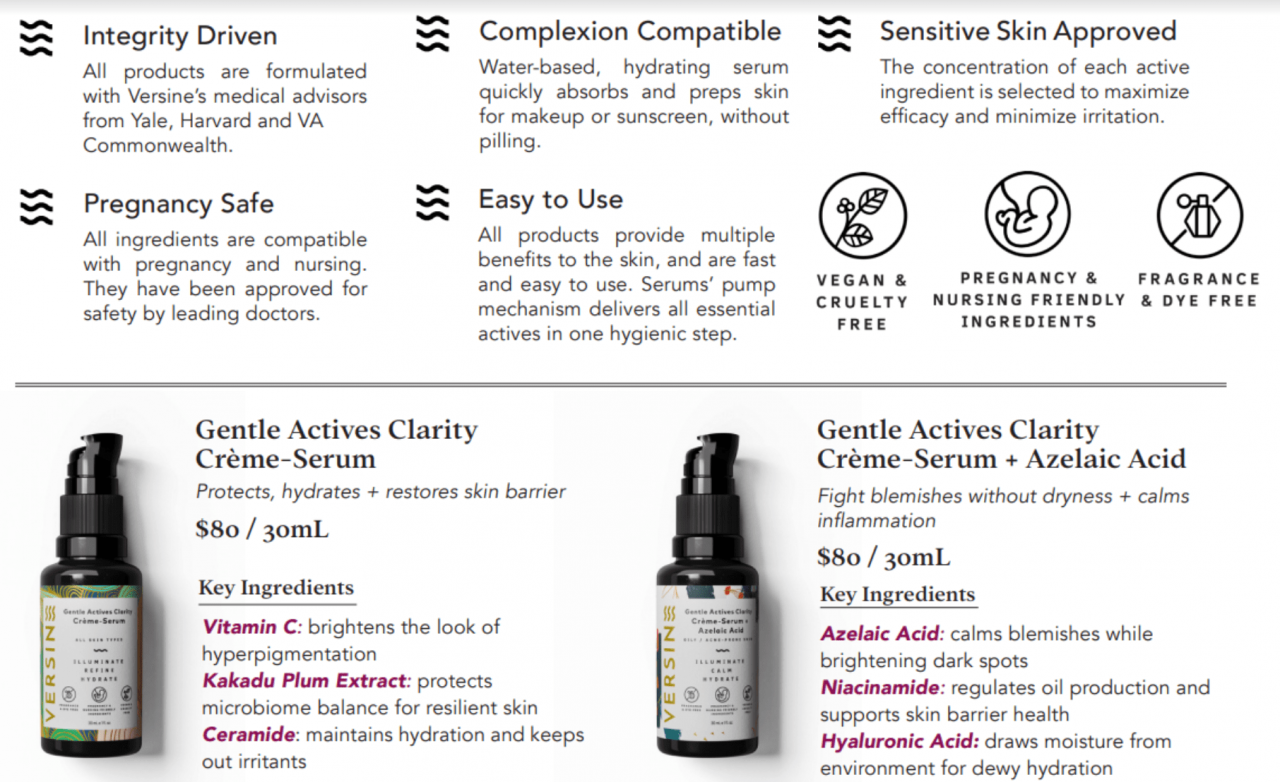Skincare cosmetics retinol – Embark on a skincare journey with retinol, the remarkable ingredient that unlocks the secret to a youthful complexion. Delve into the science behind its transformative properties, explore its diverse forms, and discover how it can revolutionize your skincare routine.
Retinol, a derivative of vitamin A, is a skincare powerhouse that addresses a multitude of skin concerns, from wrinkles and fine lines to uneven skin tone and acne. Its ability to stimulate collagen production, promote cell turnover, and enhance skin texture makes it an indispensable ally in the quest for a radiant and rejuvenated visage.
Retinol Basics
Retinol, a derivative of vitamin A, is a powerful ingredient commonly used in skincare products for its ability to improve the appearance of the skin. It works by increasing cell turnover, stimulating collagen production, and reducing inflammation.Retinoids, a class of compounds that includes retinol, are classified into different generations based on their potency.
First-generation retinoids, such as tretinoin, are prescription-only and offer the most significant results but can also cause irritation. Second-generation retinoids, like adapalene, are available over-the-counter and are less irritating than first-generation retinoids. Third-generation retinoids, such as retinol, are the weakest and are suitable for most skin types.Numerous
skincare products contain retinol, including serums, creams, and moisturizers. It’s crucial to start with a low concentration and gradually increase it as tolerated to minimize potential irritation.
Benefits of Retinol: Skincare Cosmetics Retinol
Retinol, a form of vitamin A, is a powerful ingredient in the skincare world, renowned for its remarkable anti-aging and skin-enhancing properties. Let’s delve into the multifaceted benefits of retinol, exploring how it transforms your skin’s appearance and texture.
One of the most sought-after benefits of retinol is its ability to combat the visible signs of aging. Retinol stimulates collagen production, a protein responsible for skin firmness and elasticity. By increasing collagen levels, retinol helps diminish wrinkles and fine lines, leaving your skin looking smoother and more youthful.
Improved Skin Texture and Tone
Retinol also plays a vital role in improving skin texture and tone. It exfoliates dead skin cells, revealing brighter, more radiant skin beneath. Retinol’s exfoliating properties help unclog pores, reducing the appearance of blemishes and blackheads. Furthermore, retinol inhibits melanin production, the pigment responsible for skin discoloration.
This helps even out skin tone, reducing hyperpigmentation and age spots, resulting in a more uniform and luminous complexion.
Evidence of Effectiveness
Numerous scientific studies have demonstrated the effectiveness of retinol in reducing wrinkles and fine lines. A study published in the Journal of Cosmetic Dermatology found that retinol significantly improved the appearance of wrinkles and fine lines in 80% of participants after 12 weeks of use.
Another study, published in the International Journal of Dermatology, showed that retinol was effective in reducing the appearance of age spots and hyperpigmentation in 70% of participants after 24 weeks of use.
Using Retinol Safely
Incorporating retinol into your skincare routine requires careful consideration and adherence to guidelines to maximize its benefits while minimizing potential side effects. Here’s a comprehensive guide to using retinol safely and effectively:
Guidelines for Incorporating Retinol
- Start gradually:Begin with a low concentration of retinol (0.25% or less) and use it once or twice a week to allow your skin to adjust.
- Apply at night:Retinol is more effective when applied at night, as it can cause sun sensitivity.
- Use a pea-sized amount:A small amount is sufficient to cover the entire face.
- Avoid the eyes and lips:Retinol can be irritating to these delicate areas.
- Moisturize well:Retinol can dry out the skin, so it’s essential to follow up with a moisturizer to prevent irritation.
Potential Side Effects of Retinol and Minimization
Retinol can cause some initial side effects, including redness, dryness, and peeling. Here’s how to minimize them:
- Use a buffer:Apply a moisturizer or serum before using retinol to create a barrier and reduce irritation.
- Space out applications:Gradually increase the frequency of retinol use as your skin tolerates it.
- Choose a gentle formula:Opt for products containing encapsulated retinol or retinol derivatives that are less irritating.
- Listen to your skin:If you experience severe irritation, discontinue use and consult a dermatologist.
Choosing the Right Retinol Product, Skincare cosmetics retinol
The type of retinol product you choose should be based on your skin type and concerns:
- Dry skin:Look for products with hydrating ingredients, such as ceramides or hyaluronic acid.
- Oily skin:Choose lightweight, gel-based formulas that won’t clog pores.
- Sensitive skin:Opt for products with soothing ingredients, such as aloe vera or chamomile.
- Anti-aging concerns:Look for products with higher concentrations of retinol (0.5% or more) to address fine lines and wrinkles.
Comparing Retinol to Other Ingredients
Retinol stands out among a myriad of anti-aging skincare ingredients, but it’s not the only option. Vitamin C and hyaluronic acid are two other popular choices, each with its own unique benefits and drawbacks.
Vitamin C
- Benefits:Brightens skin, reduces hyperpigmentation, protects against free radicals.
- Drawbacks:Can be unstable in certain formulations, may cause irritation in sensitive skin.
Hyaluronic Acid
- Benefits:Hydrates skin, plumps fine lines and wrinkles, improves skin elasticity.
- Drawbacks:Not suitable for all skin types, may not penetrate deeply enough to address deeper wrinkles.
Combination ProductsMany skincare products combine retinol with other ingredients to enhance their efficacy. For instance, some formulas include vitamin C to brighten skin and hyaluronic acid to hydrate. These combinations provide a comprehensive approach to anti-aging, targeting multiple concerns simultaneously.
Advanced Retinol Applications
Retinol is a powerful ingredient that can address a wide range of skin concerns. In addition to its anti-aging benefits, retinol can also be used to treat acne and hyperpigmentation.
To use retinol for acne, it is important to start with a low concentration and gradually increase it as your skin tolerates it. Retinol can help to reduce inflammation and unclog pores, which can lead to fewer breakouts. It is also important to use a moisturizer when using retinol, as it can cause dryness.
To use retinol for hyperpigmentation, it is important to be patient, as it can take several months to see results. Retinol can help to fade dark spots by increasing cell turnover and reducing the production of melanin. It is important to use sunscreen when using retinol, as it can make your skin more sensitive to the sun.
Sample Skincare Regimen Incorporating Retinol for Different Skin Types
The following is a sample skincare regimen incorporating retinol for different skin types:
- For oily skin:Cleanse your face twice a day with a gentle cleanser. Apply a retinol serum at night, followed by a moisturizer.
- For dry skin:Cleanse your face once a day with a gentle cleanser. Apply a retinol cream at night, followed by a moisturizer.
- For sensitive skin:Cleanse your face twice a day with a gentle cleanser. Apply a retinol serum every other night, followed by a moisturizer.
Resources for Finding Professional Advice on Retinol Use
If you are unsure about how to use retinol, it is important to consult with a dermatologist or other skincare professional. They can help you determine the best retinol product for your skin type and needs.
- American Academy of Dermatology: https://www.aad.org/
- The National Rosacea Society: https://www.rosacea.org/
- The Skin Cancer Foundation: https://www.skincancer.org/
Closing Notes
Incorporating retinol into your skincare regimen can be a game-changer for your complexion. By understanding its benefits, potential side effects, and appropriate usage, you can harness its transformative power to achieve your skincare goals. Embrace retinol as your trusted companion on the path to a youthful and luminous glow.
FAQ Section
Is retinol safe for all skin types?
While retinol is generally well-tolerated, it’s important to start with a low concentration and gradually increase usage to minimize potential irritation.
Can retinol be used with other skincare products?
Yes, retinol can be combined with other skincare products, but it’s best to avoid using it with harsh exfoliants or acids that may increase skin sensitivity.
How long does it take to see results from using retinol?
Results from retinol usage vary, but generally, it takes 4-8 weeks of consistent use to notice visible improvements in skin texture and tone.






Leave a Reply